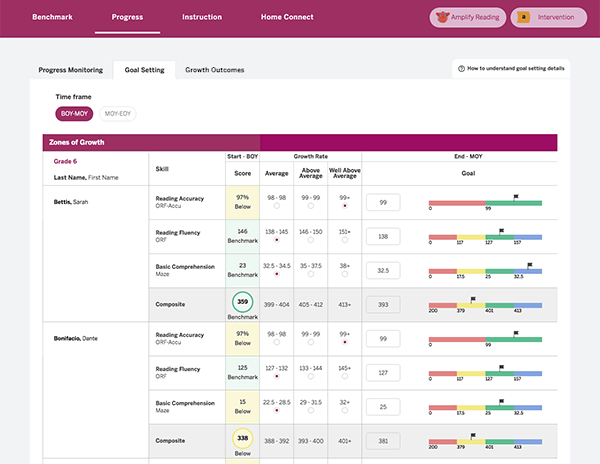Welcome, Louisiana reviewers
mCLASS Intervention is an evidence-based program for helping struggling K-6 readers catch up to grade level. Importantly, it:
- Uses data from the Louisiana state-approved early literacy screening assessment, DIBELS 8th Edition, when collected on the mCLASS platform.
- Aligns with CKLA, a Tier 1 K–5 Core Curriculum reviewed by the Louisiana Department of Education that uses similar approaches to teach reading skills.
- Gives teachers time back in the day by doing the heavy lifting of data analysis and lesson sequencing, helping make effective staff-led intervention a reality.
A collaboration between Amplify, classroom practitioners, and leading researchers including Dr. Catherine Snow, mCLASS Intervention offers Louisiana schools a standards-aligned program grounded in the science of reading. As a trusted partner across the state, we look forward to working with you to ensure teachers and students have access to high-quality instructional materials.

Program overview
mCLASS Intervention is a staff-led, supplemental Tier 2/3 intervention program that covers the five big ideas of reading, using the continuum illustrated below. Each hexagon represents a skill taught in mCLASS Intervention. Skills to the left are generally precursors to skills on the right.
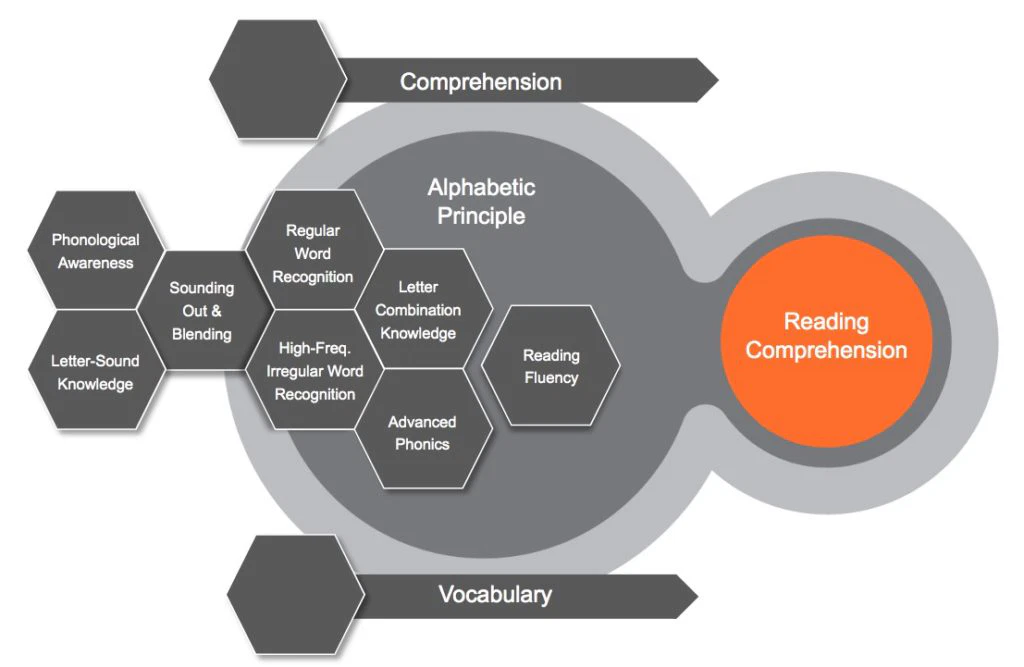
The strength of mCLASS Intervention comes from its technology-powered algorithm. Using sophisticated software algorithms, mCLASS Intervention automatically:
- Analyzes DIBELS 8th Edition and diagnostic measure results collected via the mCLASS platform.
- Determines which skills each student already knows and which they are ready to learn next.
- Puts students into small homogeneous groups of 4–6.
- Compiles detailed lessons that target the specific needs of each group.
Here is a brief example of how mCLASS Intervention identifies the right target for each student. The image below shows the MOY Nonsense Word Fluency (NWF) results for two first-grade students—Student A and Student B.
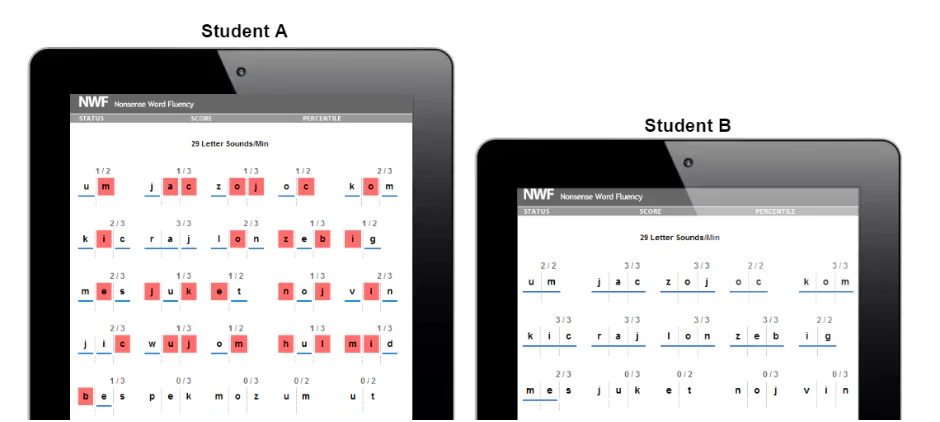
They both scored 29, which is Well Below Benchmark for this time of year. In spite of the students having the same score, mCLASS Intervention employs automatic analysis of item-level responses to detect that they are actually at different points in the continuum. For Student A, mCLASS Intervention recommends a focus on letter-sound knowledge, and sounding out and blending. For Student B, mCLASS Intervention recommends a focus on Regular & Irregular Word recognition. (mCLASS Intervention spirals instruction by having students work in two strands at the same time.) Without mCLASS Intervention, this type of analysis would take educators hours to complete and, as a result, could only be completed sporadically. The automatic nature of mCLASS Intervention’s data analysis algorithm makes it possible for busy educators to complete this analysis regularly, which in turn enables them to continually target intervention instruction at students’ evolving needs, day after day.
The mCLASS Intervention algorithm not only determines the ideal instructional focus for each student, but also automatically forms small groups of 4–6 students who share the same instructional focus and builds a 10-day plan with detailed lessons that target the specific needs of each group.
Each 10-day plan systematically builds skills. For example, in the 10-day plan below, mCLASS Intervention has a particular group of students work on phonological awareness and letter sound knowledge. And within phonological awareness, mCLASS Intervention first introduces the group to phoneme segmentation; moves students through phoneme identification and substitution in subsequent days; then finishes with first, last, and middle sound segmentation.
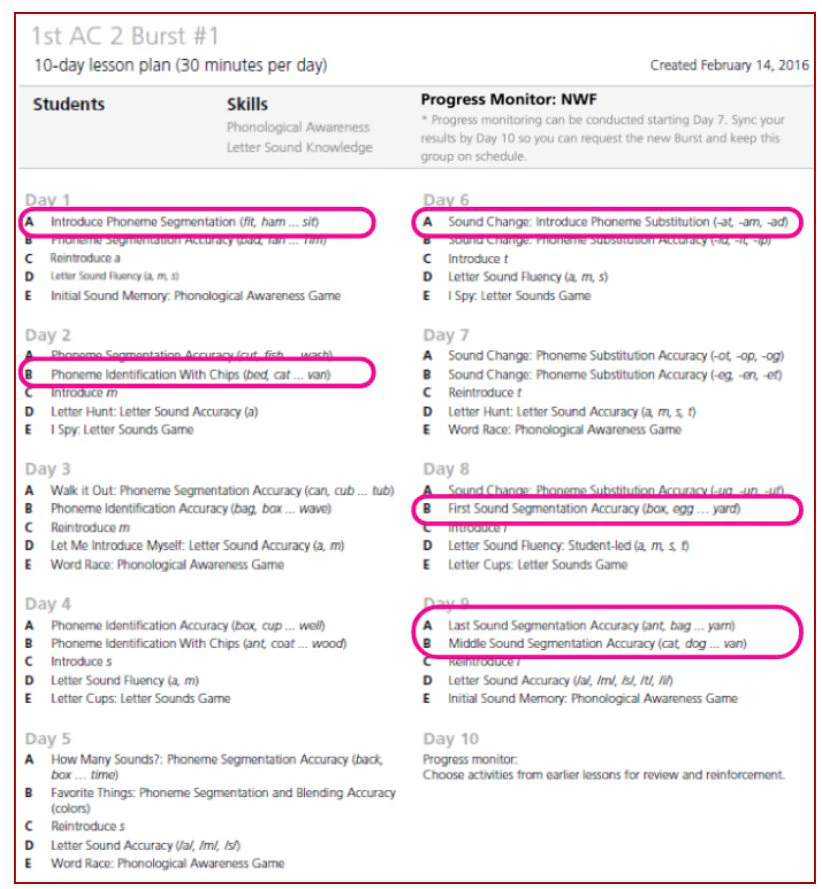
This systematic move from less advanced to more advanced skills allows for spaced practice over time, which research has shown to have significant impact on student literacy growth.
In a Tier 2 intensity, mCLASS Intervention lessons last 30 minutes per day and are delivered daily in groups of 4–6 students. Each session has five activities and each activity is 5–8 minutes long. In a Tier 3 intensity, mCLASS Intervention lessons can be 30 or 60 minutes per day and are delivered daily in groups of 3–4 students.
Below is an example of a middle sound segmentation activity.
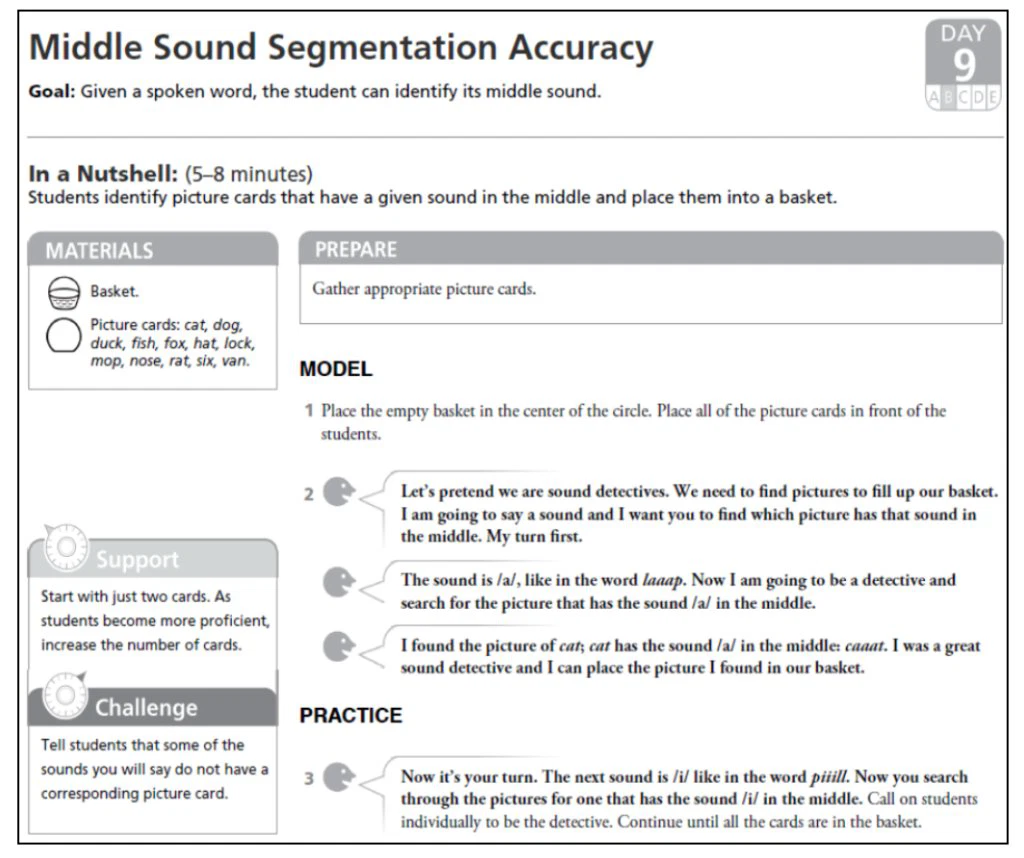
We want to highlight two things from this example: 1) The instructional approach is explicit, and 2) the guidance provided is very detailed.
Explicit instructional approach: All mCLASS Intervention activities begin with a Model (“I Do”) followed by a Practice (“You Do”). During the Model section, the instructor demonstrates how to do the activity. During the Practice section, the instructor has students practice. mCLASS Intervention uses subtle but impactful moves to maximize students’ independent thinking during the Practice portion of an activity. For example, in this activity, mCLASS Intervention has the instructor call on a student only after posing the question to all students in the group and giving the group 3–5 seconds of “think time.” This approach helps instructors keep all students mentally engaged because, should they take the opposite approach of calling on one student and then asking the question, the students who were not called on would tune out and inadvertently rob themselves of crucial practice opportunities they need to catch up to their grade-level peers.
Detailed guidance: Because mCLASS Intervention activities are detailed, both certified educators and paraprofessionals with little or no training in early elementary reading can deliver mCLASS Intervention with impact. This detailed guidance gives schools a range of options when it comes to staffing intervention, and that added flexibility is vital—especially for moderate and high need schools, which often struggle to provide intervention to all students in need.
Keep in mind that an activity such as the one above represents just 1/5th of a lesson. The additional four activities that round out a 30-minute intervention lesson are short (5–8 minutes each) and varied. Some cover one skill of focus, while others cover the other skill of focus. mCLASS Intervention also regularly incorporates game-based, kinesthetic, peer-to-peer approaches to further increase student engagement and, as a result, educators often report that mCLASS Intervention is their students’ favorite part of the day. We think this is because students get more attention in a small group; the instruction is targeted to their needs so they are neither bored nor overly frustrated; and the 30 minutes are filled with short, varying, fast-paced, high-energy activities.
The swift pace of mCLASS Intervention is present in the activities that older students work on as well. These students often work on fluency and comprehension at the same time. In the 10-day plan below, you can see how their lessons include the same structure of short and varying activities.
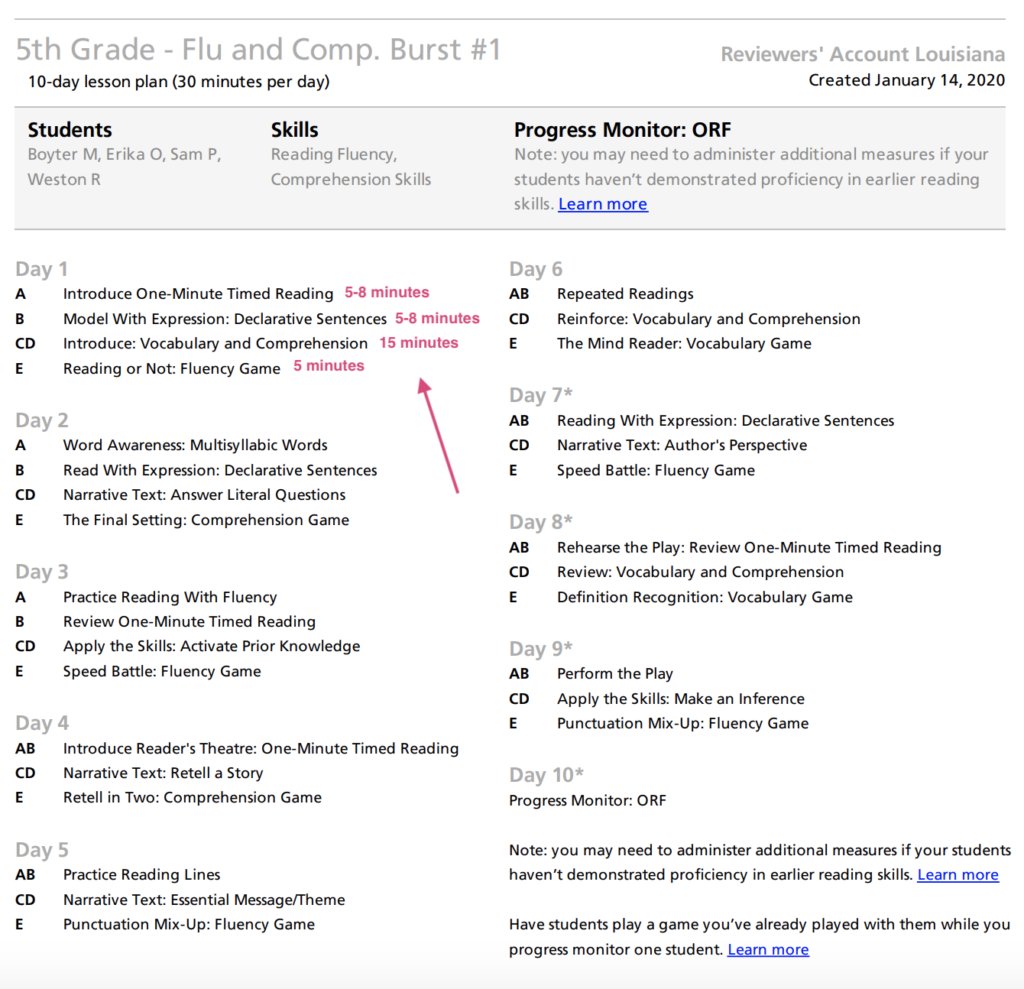
Program components
Site License
Each school needs a site license to the mCLASS Intervention software. This provides access to the tools interventionists use throughout the year, such as:
- An assessment app for conducting progress monitoring.
- A grouping tool that forms small groups of 4–6 students with similar skill profiles.
- A lesson builder that delivers customized 10-day lesson plans for groups.
See sample 10-day lesson plans
- Analytical reports for reviewing progress.
- A practice app for K–2 students to use outside of intervention time.
mCLASS Intervention Kit
mCLASS Intervention kits are recommended, but optional. These kits include the following materials that interventionists bring to lessons:
- Picture cards
- Letter cards
- Regular word cards
- Irregular word cards
- Letter combination cards
- Vocabulary cards
- Fluency cards
- Puppet
- Resealable bags
- Magnifying glass
- Portable whiteboard
- Dry-erase markers
- Counting chips
- Decoding assessment book
- Vocabulary assessment books
- Comprehension assessment book
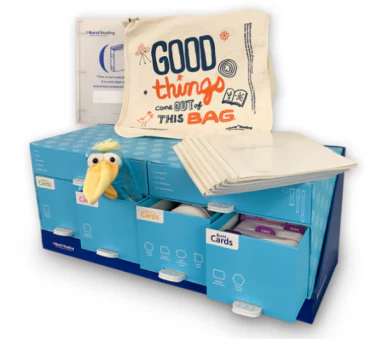
We recommend one mCLASS Intervention kit per interventionist serving K–3 and one mCLASS Intervention kit per interventionist serving 4–6.
If a school is not able to purchase one kit per interventionist, educators can assemble the materials themselves using our directions here.
DIBELS 8th Edition Kit
Educators administer DIBELS 8th Edition and proprietary diagnostic probes to place intervention students into the program.
Schools can purchase DIBELS 8th Edition kits through Amplify or download forms from the University of Oregon’s site here.
For the proprietary diagnostic probes, educators can find the assessment forms in the mCLASS Intervention kit or download them from our teacher portal here.
Getting mCLASS Intervention up and running
We have step-by-step guides with training videos and detailed FAQs to help educators get mCLASS Intervention running smoothly in their schools.
- Schools that screen with DIBELS via mCLASS follow these steps to get Intervention up and running.
- Schools that screen with another reading assessment (e.g., paper/pencil DIBELS, iReady, NWEA MAP) follow these steps to get Intervention up and running.
Take a tour
Find step-by-step instructions for reviewing lessons and placement materials in our navigation guide.
This short video below shows you what those steps look like.
Professional development
For more than a decade, Amplify has provided high-quality customized professional development to meet the specific needs of educators at all levels and improve student outcomes across multiple schools, districts, and states. Our professional development opportunities extend beyond initial product trainings and are proven to leverage data to support effective implementation, consistent administration, focused progress monitoring, skill-focused data analysis, and instructional planning.
There are two distinct roles in mCLASS Intervention critical to ensuring its success at a school site. Professional development is designed to target these different roles:
- Intervention Coordinator:
Oversees the mCLASS Intervention program, groups students, determines group assignments, adjusts schedules, and works closely with Interventionists. - Interventionists:
Instructors who deliver the daily mCLASS Intervention program to small groups of students and monitor students’ progress every two weeks.
We deliver professional development sessions through multiple formats, including:
- Onsite:
Sessions are delivered in person (30 participants). - Virtual:
Sessions are delivered remotely through webinars (15 participants). - On demand:
Resources are posted on the training platform and can be accessed anytime (Individually).
We offer two types of training to support implementation of mCLASS Intervention: Initial Training Sessions and Coaching Sessions.
| TRAINING TYPE | PURPOSE | DATE |
| Initial Training Sessions | Introduce all stakeholders to mCLASS Intervention and the responsibilities of their individual roles. | Beginning of year |
| Coaching Sessions | Support Intervention Coordinators with data management and fidelity, and support teachers with lesson delivery, progress monitoring, and data analysis. | As identified by school |
|
Initial Training Sessions |
||
|---|---|---|
|
Training title |
Modality |
Objectives |
|
Comprehensive Initial Training 1.5 days Hybrid model* |
|
Interventionist coordinator objectives:
Interventionist objectives:
|
|
Comprehensive Initial Training 1.5 days Remote model* |
|
|
*Depending on your needs, Amplify can also deliver these sessions in a Training of Trainers (TOT) model, where sessions are delivered to select leaders from each school, and participants will turn-key training content to their colleagues.
Our Coaching Sessions are also offered in multiple formats, to include full- and half-day in-person sessions, and hourly remote sessions.
|
Coaching Sessions |
||
|---|---|---|
|
Training title |
Modality |
Objectives |
| One-day Coaching | 1-day onsite |
Objectives for these sessions will depend on the content needs determined by the school. Topics can include but are not limited to:
|
| Half-day Coaching | ½-day onsite | |
| Hourly Coaching | 1-hour remote | |
FAQ’s
Do schools need to screen with mCLASS DIBELS 8th Edition to use mCLASS Intervention?
No. Amplify has an mCLASS Intervention offering designed for schools that use their own reading screener. These schools use the results from their own reading assessment to determine who’s at risk. Then they administer DIBELS 8th Edition and Amplify’s proprietary diagnostic measure via mCLASS to the students who will receive mCLASS Intervention. Of course, we highly recommend using mCLASS DIBELS 8th Edition for screening the entire class, as it would efficiently serve as both a screener and placement tool into mCLASS Intervention.
How does placement into mCLASS Intervention work?
You can learn on our teacher portal site. Here are the placement procedures for schools that:
Screen with their own reading assessment
Does mCLASS Intervention teach skills that are taught in previous grades?
Yes, mCLASS Intervention was designed to detect students’ earliest skill gaps and provide teachers with high-quality resources for addressing them.
How do teachers set goals?
mCLASS Intervention comes with a goal-setting tool that helps educators choose goals for students. It does this by providing score ranges that represent average, above average, and well above average growth in the skills being worked on.
